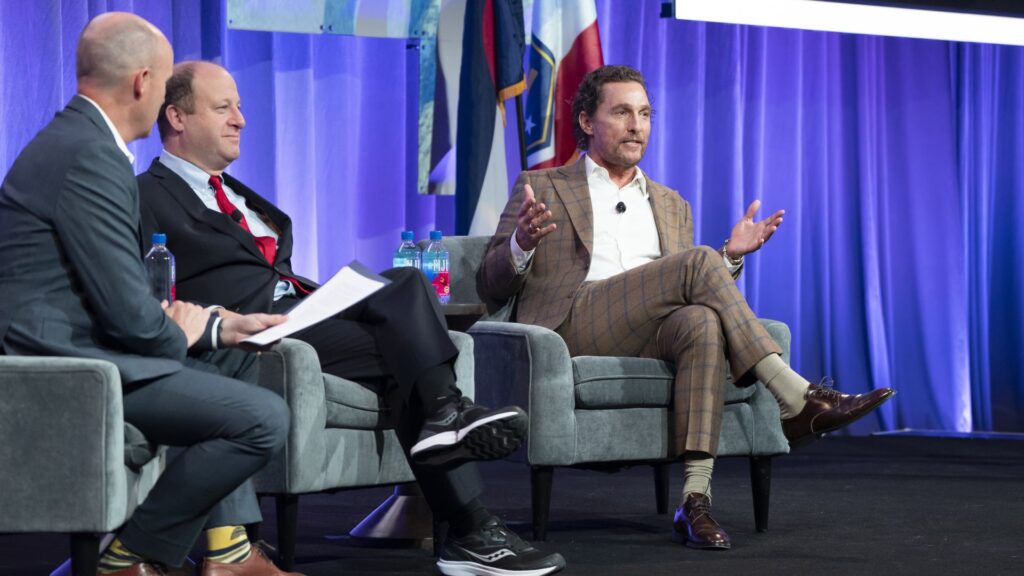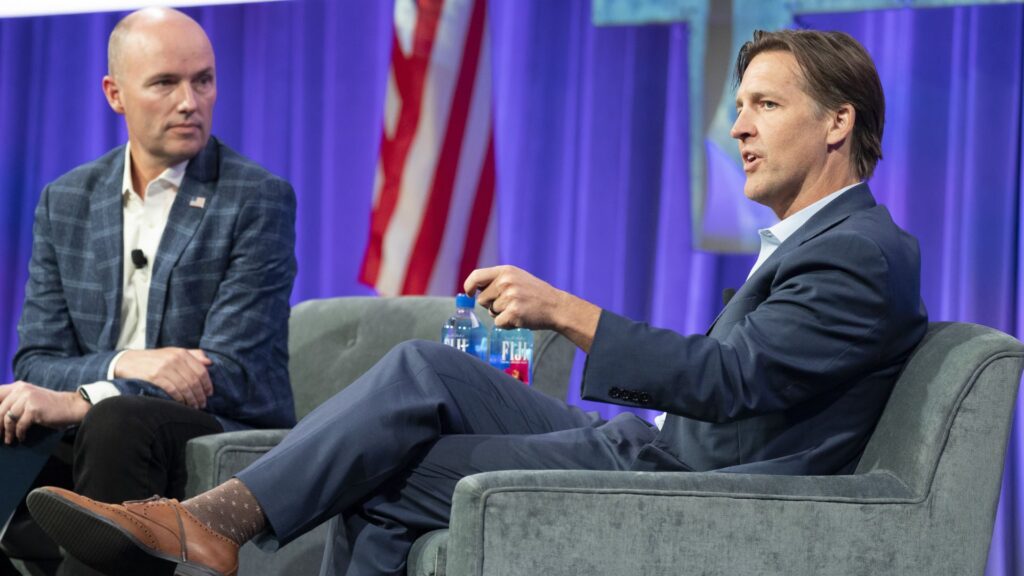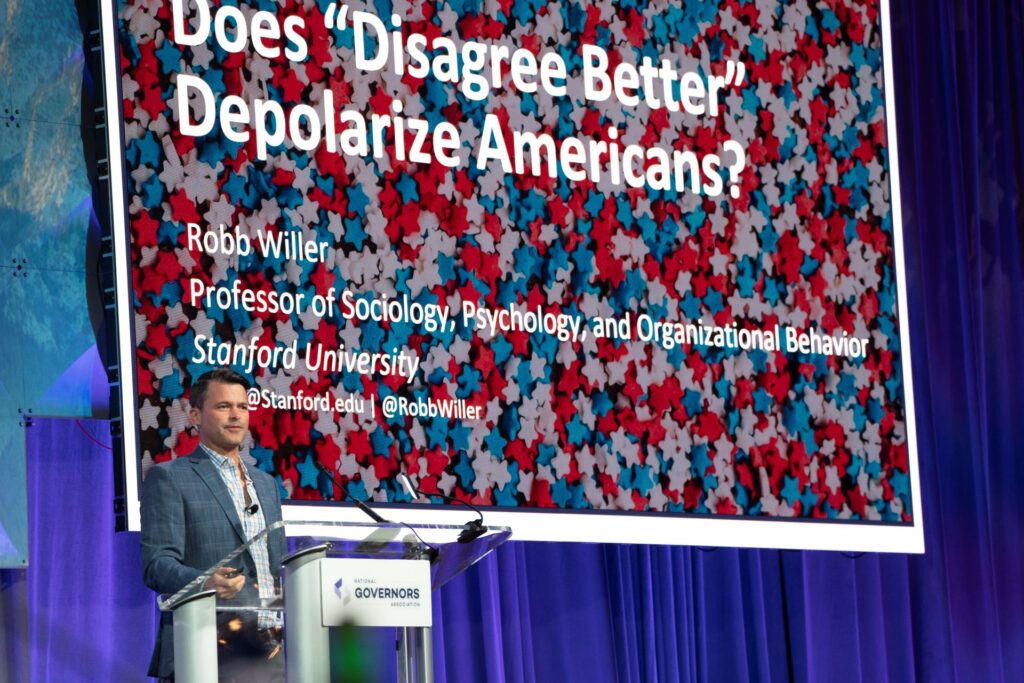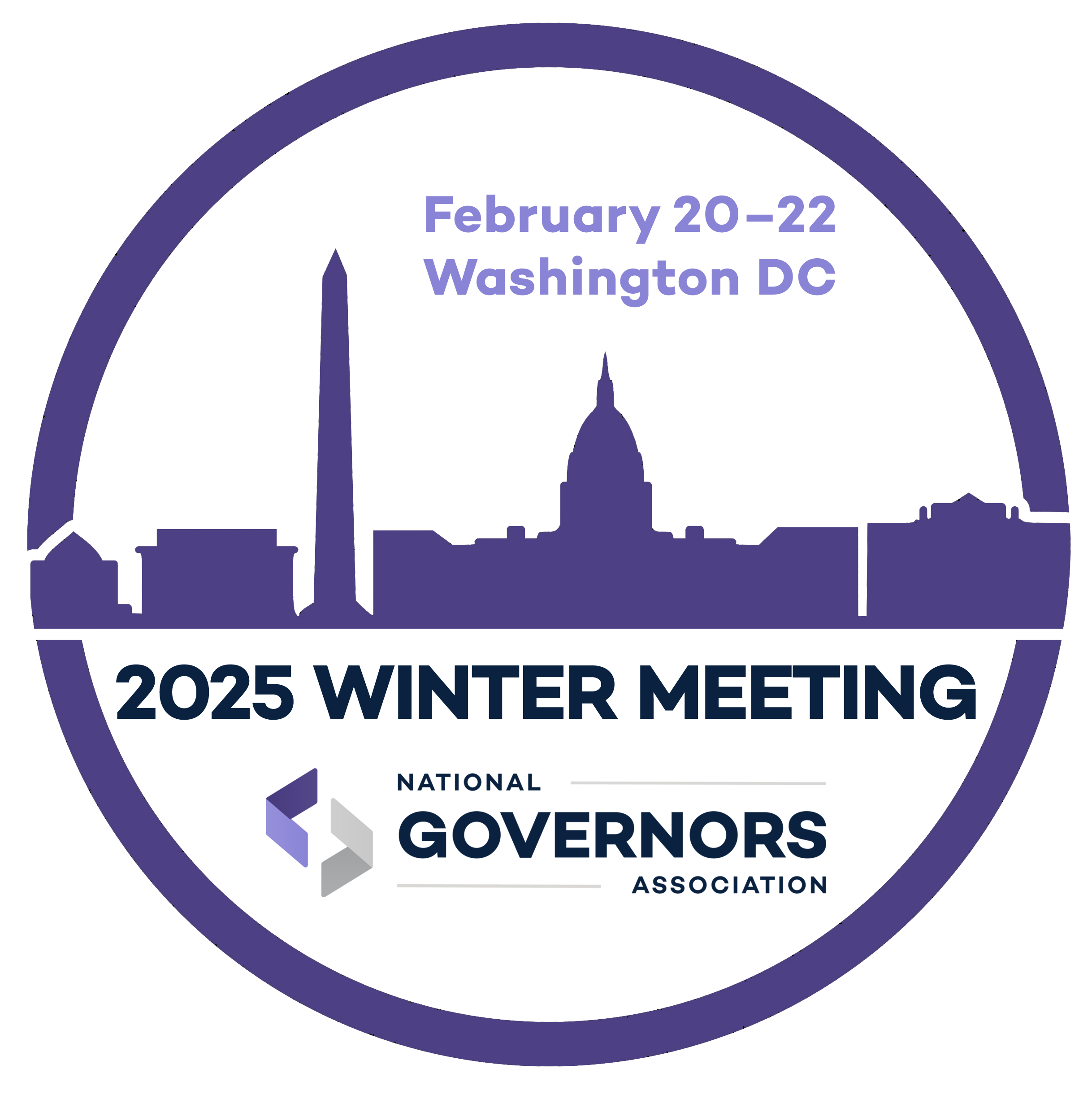“In our country today, we’ve gotten really, really good at tearing things down. Building institutions is hard work; tearing them down is easy. We need some architects. We need more builders. And that’s exactly what we’re trying to do.”
Governor Spencer Cox

At the 2024 NGA Summer Meeting, Utah Governor Spencer Cox wound down his Disagree Better initiative with a look back – thanking the 20-plus Governors who recorded videos for the year-long campaign and reviewing study results measuring their impact. And he also looked forward – examining how polarization is playing out on college campuses and in the broader culture, and exploring what we can do about it.
Matthew McConaughey on polarization in culture: Taking back the microphone
Actor and author Matthew McConaughey joined Governor Cox and Colorado Governor Jared Polis for a conversation on the role of culture in polarization. The Governors first met virtually with McConaughey a few months ago to talk about, as Governor Cox put it, how to “get Disagree Better into the cultural bloodstream.”

“It’s one thing to have politicians say this stuff, and that’s important,” Cox noted. “But it’s much better to have important cultural figures actually talk about this as well.”
McConaughey shared why he wanted to get involved. “It’s important to me; it’s important to everyone,” he commented. “We seem to be in a bad situation right now: The extremes seem to be going further left and further right. Decency doesn’t seem to be on the table … It can change. I think we’re all hungry for it. America is hungry for it.”
Governor Polis raised the issue of the “well-documented Perception Gap” through which “Democrats assume worse of Republicans, and Republicans assume worse of Democrats, and really mischaracterize what they’re even opposed to.”
“The extremes on the right and left, they have the microphone,” McConaughey replied. “This 60% in the middle of that, where we do agree on the basic values, we gotta take the mic back … It’s harder to sell belief and hope than it is fear. Let’s admit that, and then let the healthy stuff of hope and belief, give it some teeth. And become better marketers and salespeople of that … How do we negotiate, the right way, with decency? And show that the two sides can at least walk away understanding and going, ‘I hear where you’re coming from’?”
Ben Sasse: Building institutions for a hybrid culture
In another Disagree Better session, University of Florida President Ben Sasse identified media fragmentation and the rise of smartphones as factors disrupting relationships and exchange of information. Use of smartphones, he noted, “takes your consciousness beyond a time and place where you’re breaking bread around the table with someone.”
In his 2018 book “Them: Why We Hate Each Other — And How to Heal,” Sasse included chapters like “The Loneliness Epidemic,” “The Comforts of Politi-tainment” and “The Polarization Business Model” – all themes the Disagree Better initiative explored in detail throughout the year.

“There is no large, shared conversation that’s being had anywhere in America,” Sasse continued. “We have to recognize how that drives us toward tribalism … We have to be cognizant of the fact that the business model is to go narrow and deep and give lots of voice to the angriest people. Most Americans aren’t that angry.”
As a college president, Sasse offered a firsthand perspective on how these trends are stifling constructive debate on college campuses. “Most of these protests right now aren’t trying to persuade other people; they’re trying to signal to the closest kin around you that you’re purer and deeper in your commitment to the cause,” he explained. “That’s really different than a big, broad American idea where persuasion is more important than violence.”
Referencing Alexis de Tocqueville’s observations in his 19th century writings “Democracy in America,” Governor Cox noted Americans once found unity in institutions like churches and associations like the Rotary Club. Now that Americans live in a “well-documented era of a destruction of institutions,” how can we build institutions to bring people together?
“We haven’t figured out the answer to that problem, and that’s the challenge before us,” Sasse responded. “The future is going to be hybrid, and we have to build new Tocquevillian institutions for a world where you are partly in community with people bodily … and also convene [virtual] communities. Right now, we don’t have the founding wave of new Tocquevillian institutions for a hybrid era. And we’re always going to live in a hybrid era.”
Study results: Leadership matters
Stanford University’s Robb Willer highlighted the role elected officials can play in bringing Americans together. As director of the Stanford University Polarization and Social Change Lab and co-director of the Center on Philanthropy and Civil Society, Willer studies the impact of depolarization messaging.
“We’re all in the depolarization business if we have any kind of state, federal or societal-level goals,” he stated. “Because if you don’t have a plan for navigating partisan division, you don’t have a plan for social impact.”

Willer tested Disagree Better ads in a randomized controlled study including 6,500 Americans. Some were shown Disagree Better ads while others were in a placebo group that viewed non-political ads.
Researchers found evidence that Disagree Better ads had a depolarizing impact on viewers – leading to lower levels of animosity toward supporters of the other party, greater receptiveness to conversations with supporters of the other party, and greater support for bipartisan political cooperation.
Participants in the control group also came away with a better impression of the Governors who participated in the ads – recording high favorability ratings.
“When people saw these bipartisan announcements, they didn’t just turn toward bipartisan openness to difficult conversations,” Willer explained. “They also thought, ‘Those people who did that were pretty cool; they did a tough thing, and I respect them more for it.’”
The favorability impact was just as strong among primary voters, who typically among the most hardened partisans. “It increased their respect for those of you who took part in it,” Willer concluded. In fact, the impact was so significant that Disagree Better can be considered not just good policy, but good politics. “In the context of a campaign, you might consider doing Disagree Better to advance your candidacy,” he added.
When it comes to assessing why Disagree Better was so effective in reducing partisan division, Willer has a simple answer: “Leadership matters. When you’re in a position of considerable influence – when you’re a politician leading a state, leading a country – you’re in a position to change people’s minds about things. And when people see it, they’re impressed. They’re moved.”
Disagree Better goes to college
A number of colleges and universities are launching Disagree Better courses, through which students can earn college credit by learning conflict-resolution tools and strategies. A panel of college and university presidents representing the Presidents Forum updated Summer Meeting participants on the goals and results of the first wave of Disagree Better courses.

- Sue Ellspermann (President, Ivy Tech Community College of Indiana): “We know as higher education, we need to be part of the solution. Disagree Better is a way we can be engaged. Members of the Presidents Forum are innovative, forward-leaning institutions serving mostly working learners. We don’t have college campuses with housing and sports; we’re working with upskilling Americans every day. In this area, we think we can do some good work together.”
- Becky Takeda-Tinker (President, Colorado State University Global): “Data shows students have felt better about learning how to Disagree Better; it really matters. The impact of what we’re able to do through fully online education and how to keep non-traditional students engaged has been put into play with this course. 89% of students felt the course provided them with the tools to have productive conversations in both personal and professional settings … Our learners today, in order to get them to finish a program, there has to be something in it for them. We look at what job posts are seeking. Communication skills are definitely on those lists. [In terms of] what the market is demanding, we know that [Disagree Better] is a valuable skill their employer wants them to have.”
- Greg Fowler (President, University of Maryland Global Campus): “In the modern workplace, the ability to manage disagreements is vital, and we need to equip our students with the skills they need to succeed. Courses like those we have designed will effectively foster this essential skill, benefiting our communities in numerous ways. When we send our service members and families [around the world], one of the things they have to do is figure out how to engage with those local populations, who in many cases see the world very differently than they do.”
- Frank Dooley (Chancellor, Purdue Global): “We’re seeing states across the country [reevaluate which] positions in state government do you need a degree for. This is an example of one of those skills that maybe you don’t have to have the degree, but you certainly need the skills and competency to get there. We took faculty from our communications and political science departments, put them together and asked: ‘What does it mean to Disagree Better?’ We came down to two fundamental concepts: positive conflict management (not just in politics; think how many managers have a hard time delivering bad news to their employees), and artful persuasion (simply learning how to make a more compelling argument).”
It is the leadership of Governors, said Governor Cox, that makes him hopeful for the future:
“I am very hopeful about our country. I’m hopeful because I get to serve with you. I’m hopeful because there are good people in this country. I’m hopeful because the people in this room are not willing to let this happen to us. We can make this a better place, we can love each other again, we can disagree without hating each other. We can have passionate debates, and we do. We can fight about immigration and abortion. But at the end of the day, ladies and gentlemen, we are Americans. And America is still the greatest country on the face of the earth. I’m proud to be an American, and I’m hopeful for this country.”
Governor Spencer Cox













